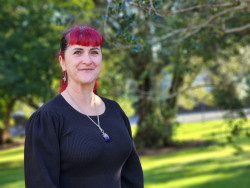Putting the future normal of volunteering into practice

As we celebrate our annual LoVE Awards – honouring amazing Leaders of Volunteer Engagement and outstanding volunteer programmes – we asked the Clare Nash, IHC’s Volunteer Co-ordinator North Shore & Central West Auckland what their "future normal" might look like in a practical way, and what the IHC are doing, or planning on doing, to turn that into reality.
Clare shares her thoughts below.
IHC’s One-to-One Friendship, Skill Based Learning and i-Volunteering programmes are facilitated nationwide by eight Volunteer Coordinators. Making connections between volunteers and people with intellectual disabilities, our programmes objective is to make a difference in someone’s life whilst gaining a new friend in the process.
We are fortunate to have devoted volunteers who have been with the one-to-one friendship program for almost as long as it has existed, 17years. It is probably safe to say that recruiting volunteers who can make a long-term commitment is getting harder, as people struggle with time management, the rising cost of living and other responsibilities like taking care of grandchildren so parents can go to work.
If our focus today is 'What is our Future Normal' allow me to briefly discuss what IHC intends to do and we believe we could do.
IHC understands that the way we work and volunteer has changed. Therefore, to attract volunteers there should be flexibility and choice in how a person wants to gift their time. Skill-based learning was developed in 2012 to provide the opportunity to offer shorter term volunteer opportunities and still recruit longer serving volunteers. International trends showed this change was how people wanted to volunteer and IHC responded. During COVID-19 lockdown, the work IHC volunteer coordinators did to engage with people online provided the opportunity to expand the programme to remote regions. This allowed us to recruit busy active people who still wanted to volunteer however were time-poor when it came to traditional volunteer roles. Online volunteering comes with challenges, the most significant of which is to ensure online safety for volunteers and the person they are matched with.
IHC places a high priority on the welfare of volunteers and Volunteer Coordinators are well supported with resources to identify areas of concern as they build strong connections with a person who has an intellectual disability. Effective and regular communication is offered with regular friendship reviews and providing opportunities to upskill through training sessions and workshops. More recently, IHC has hosted Mental Health Tool Kit workshops which have given volunteers the chance to learn how to check in with their own mental health and recognize that taking care of yourself comes before taking care of others. Currently IHC is expanding their training to being available online for volunteers along with bringing the national team together it will provide accessible training sessions to volunteers with limited time.
As leaders of volunteers, we need to monitor national and international trends and keep learning as the volunteer landscape evolves. IHC provides Volunteer Coordinators the opportunity to attend ongoing professional development and supports us to establish strong ties with our local volunteer centre and other community groups, attend workshops and expos to broaden our expertise and networking. This will provide the opportunity to stay well informed and address changes and challenges head on.
Going forward I plan to begin holding frequent meetings with the other volunteer coordinators in my community. Together we can talk about the most recent developments in volunteering and determine how we can help one another.
I see our future normal as working more closely together to create a robust community for volunteers.
Clare Nash
Volunteer Coordinator North Shore & Central West Auckland, IHC New Zealand

